

BalancEdTech. Making Exams More about Learning. March 20, 2012 By: Maryellen Weimer, PhD in Educational Assessment We give exams to assess mastery of material—are students learning the course content?
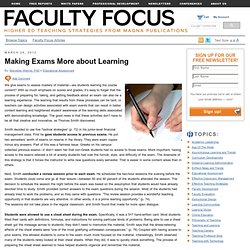
With so much emphasis on scores and grades, it’s easy to forget that the process of preparing for, taking, and getting feedback about an exam can also be a learning experience. The learning that results from these processes can be tacit, or teachers can design activities associated with exam events that can result in better content learning and heightened student awareness of the learning skills associated with demonstrating knowledge. The good news is that these activities don’t have to be all that creative and innovative, as Thomas Smith discovered. Smith decided to use five “tactical strategies” (p. 72) in his junior-level financial management class. Next, Smith conducted a review session prior to each exam. Smith’s exam questions require an answer with justification.
Reference: Smith, T. Recent Trackbacks. 5 Tips For Assessing What Students Know. It is not enough to teach students how to understand information and communications technology.
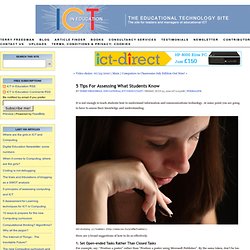
At some point you are going to have to assess their knowledge and understanding. Girl studying. (c) hvaldez1 ( are 5 broad suggestions of how to do so effectively. 1. Set open-ended tasks rather than closed tasks For example, say: “Produce a poster” rather than “Produce a poster using Microsoft Publisher”. The open-ended approach can be adapted for use with all age groups, in my experience. 2. This suggestion assumes that the course is a problem-solving one rather than once concerned purely with skills. It does not require there to be one right answer. 3. The finished product indicates very little about ICT capability. Your boss asks you to prepare a presentation on the subject of what the school offers by way of ed tech facilities, to be shown to prospective parents at a forthcoming Open Day. 4. 5. Is the skatepark a Professional Learning Community?
Dr.
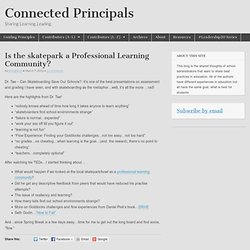
Tae – Can Skateboarding Save Our Schools? : It’s one of the best presentations on assessment and grading I have seen, and with skateboarding as the metaphor…well, it’s all the more …rad! Here are the highlights from Dr. Tae! “nobody knows ahead of time how long it takes anyone to learn anything”“skateboarders find school environments strange”“failure is normal…expected”“work your ass off till you figure it out”“learning is not fun”“Flow Experience: Finding your Goldilocks challenges…not too easy…not too hard”“no grades…no cheating…when learning is the goal…(and the reward), there’s no point to cheating”“teachers…completely optional”
Student Self-Assessment: A Sample Assignment. February 1, 2012 By: Maryellen Weimer, PhD in Teaching Professor Blog For me examples are like pictures; worth a 1,000 words.
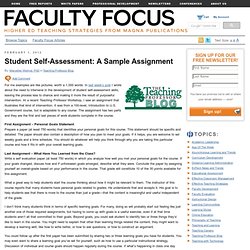
In last week’s post I wrote about the need to intervene in the development of student self-assessment skills, leaving the process less to chance and making it more the result of purposeful intervention. At a recent Teaching Professor Workshop, I saw an assignment that illustrates that kind of intervention. It was from a 100-level, Introduction to U.S. First Assignment – Personal Goals Statement Prepare a paper (at least 750 words) that identifies your personal goals for this course. Last Assignment – What Have You Learned from the Class? Effective Education Fosters Experiences Provoking Quality Reflections.
Making Sure They Are Learning. Sarah Kaufmann: I think of authentic assessment as my ability to teach each student where they actually are.
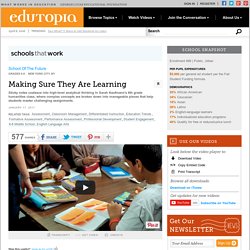
I'm Sarah Kaufmann. I teach sixth grade humanities at School of the Future. In order to know where they actually are, I have to be able to assess them really specifically and in a variety of ways that are appropriate for that student, so that what I'm doing is every day giving that child an environment where they're challenged, where they feel good about what they're learning and they feel like they're learning. Stacy Goldstein: What's been amazing to watch in Sarah's class as a sixth grade teacher is also, she just is extremely rigorous in what she demands from the kids. And so her class really has high standards. Google Forms - More Than Just Multiple Choice. Assessment Resources Online Professional Development - UW Stout, Wisconsin's Polytechnic University. Here you will find a hand selected index of authentic assessment resources.
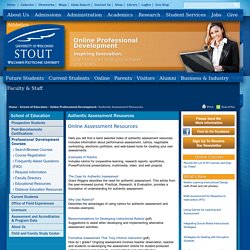
Includes information about performance assessment, rubrics, negotiable contracting, electronic portfolios, and web-based tools for creating your own assessments. Examples of RubricsIncludes rubrics for cooperative learning, research reports, eportfolios, PowerPoint/oral presentations, multimedia, video, and web projects The Case for Authentic AssessmentGrant Wiggins describes the need for authentic assessment. This article from the peer-reviewed journal, Practical, Research, & Evaluation, provides a foundation of understanding for authentic assessment. Why Use Rubrics? Recommendations for Developing Instructional Rubrics (pdf)Suggestions to assist when developing and implementing alternative assessment activities.